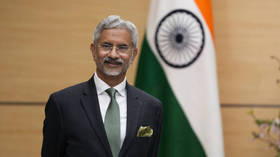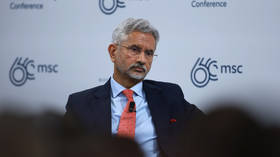India will no longer be ‘swayed by imported prescriptions’ – top diplomat

New Delhi is no longer “swayed by imported prescriptions” when formulating its foreign policy, and measures all things in terms of its national interests, the country’s External Affairs Minister Subrahmanyam Jaishankar asserted in a column in The Indian Express. He also suggested that in a world where “everything is being weaponized,” it is vital for the country to ensure that its strategic capabilities are developed in-house.
“Swayed by imported prescriptions, we’ve sometimes subordinated our own goals for the benefit of others,” Jaishankar noted. The big change in India now, according to Jaishankar, is that there is a strong sense of “Bharat first.” ‘Bharat’ is the name for the country in several Indian languages: it is also being championed as a new political concept by the ruling Bharatiya Janata Party (BJP).
“Politically, Bharat is a statement of independence,” Jaishankar declared last year, shedding light on the new policy. “It is a declaration that as India engages the world, it doesn’t have to be done necessarily in terms set by others or in frameworks determined by others.” Speaking at an event at New Delhi’s Jawaharlal Nehru University earlier this year, he stressed that Indian foreign policy imperatives would no longer be influenced by “imported ideologies.”
In his latest column, Jaishankar also argued that New Delhi’s new policy has encouraged it to pursue a “multi-vector diplomacy that would maximize our partners and minimize our problems.”
In its engagements with allies in the Quad or BRICS, I2U2, SCO or East Asia Summit, India’s interests have been “at the core of its calculations,” Jaishankar observed, adding that these initiatives have often involved partners who are “at odds with each other.”
“Where we have to take a stand, we do not hesitate or come under pressure,” Jaishankar wrote. Despite constant scrutiny from the West, Jaishankar has repeatedly advocated maintaining robust ties with Russia. At the Munich Security Conference held in February, he argued that India should be “admired” for its balanced relationships with partners in the West as well as countries like Russia, Iran and others that are heavily sanctioned.
The country has saved billions of dollars on oil imports over the past two years by purchasing discounted crude from Russia, according to data compiled by ICRA Research ratings agency.
The diplomat emphasized that relying on the “Make in India” strategy in areas such as defense, technology and innovation is vital for India’s national security, rather than just the economy.
“In the post-Covid world, all significant nations are in the quest for strategic autonomy. Even the most developed are concerned about the hollowing out of their capabilities and dependence on over-concentration elsewhere. In a world where everything is being weaponized, India too has to ensure that its basic needs and critical infrastructure are nationally developed,” he wrote. He added that in order “to overcome the neglect of the past,” the country should leapfrog, especially with regards to critical and emerging technology.
Where India Meets Russia – We are now on WhatsApp! Follow and share RT India in English and in Hindi














